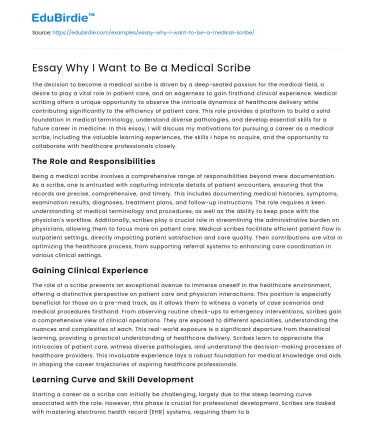The decision to become a medical scribe is driven by a deep-seated passion for the medical field, a desire to play a vital role in patient care, and an eagerness to gain firsthand clinical experience. Medical scribing offers a unique opportunity to observe the intricate dynamics of healthcare delivery while contributing significantly to the efficiency of patient care. This role provides a platform to build a solid foundation in medical terminology, understand diverse pathologies, and develop essential skills for a future career in medicine. In this essay, I will discuss my motivations for pursuing a career as a medical scribe, including the valuable learning experiences, the skills I hope to acquire, and the opportunity to collaborate with healthcare professionals closely.
The Role and Responsibilities
Being a medical scribe involves a comprehensive range of responsibilities beyond mere documentation. As a scribe, one is entrusted with capturing intricate details of patient encounters, ensuring that the records are precise, comprehensive, and timely. This includes documenting medical histories, symptoms, examination results, diagnoses, treatment plans, and follow-up instructions. The role requires a keen understanding of medical terminology and procedures, as well as the ability to keep pace with the physician's workflow. Additionally, scribes play a crucial role in streamlining the administrative burden on physicians, allowing them to focus more on patient care. Medical scribes facilitate efficient patient flow in outpatient settings, directly impacting patient satisfaction and care quality. Their contributions are vital in optimizing the healthcare process, from supporting referral systems to enhancing care coordination in various clinical settings.
Save your time!
We can take care of your essay
- Proper editing and formatting
- Free revision, title page, and bibliography
- Flexible prices and money-back guarantee
Gaining Clinical Experience
The role of a scribe presents an exceptional avenue to immerse oneself in the healthcare environment, offering a distinctive perspective on patient care and physician interactions. This position is especially beneficial for those on a pre-med track, as it allows them to witness a variety of case scenarios and medical procedures firsthand. From observing routine check-ups to emergency interventions, scribes gain a comprehensive view of clinical operations. They are exposed to different specialties, understanding the nuances and complexities of each. This real-world exposure is a significant departure from theoretical learning, providing a practical understanding of healthcare delivery. Scribes learn to appreciate the intricacies of patient care, witness diverse pathologies, and understand the decision-making processes of healthcare providers. This invaluable experience lays a robust foundation for medical knowledge and aids in shaping the career trajectories of aspiring healthcare professionals.
Learning Curve and Skill Development
Starting a career as a scribe can initially be challenging, largely due to the steep learning curve associated with the role. However, this phase is crucial for professional development. Scribes are tasked with mastering electronic health record (EHR) systems, requiring them to be quick and precise in documentation. They also develop the ability to identify and record key information during patient consultations, which demands attention to detail and discernment. Over time, scribes become adept at understanding the nuances of different healthcare providers' styles and preferences, enhancing their adaptability and efficiency in various clinical settings. This skill-building journey significantly improves a scribe's ability to function in a dynamic healthcare environment, fostering critical thinking and honing decision-making abilities. The experience prepares them for future medical careers and instills confidence and proficiency in handling diverse clinical situations.
Personal and Professional Growth
The journey of being a medical scribe is marked by significant personal and professional growth. It challenges individuals to develop meticulous attention to detail, a skill crucial in the medical field. Scribes learn to manage high-pressure situations, honing their ability to stay focused and efficient amidst a fast-paced clinical environment. This role also cultivates strong communication skills, as scribes must effectively interact with physicians, healthcare staff, and sometimes patients. The adaptability and quick learning required in this position foster resilience and confidence, qualities that are invaluable in any medical career. As scribes navigate the complexities of healthcare settings, they gain insights into medicine's operational and ethical aspects. This comprehensive development not only prepares them for medical school but also for their future roles as healthcare providers.
Networking and Mentorship
Medical scribing offers extensive networking opportunities, allowing for connections with various healthcare professionals. This can lead to mentorship, advice on medical school applications, and even letters of recommendation. It's a chance to learn from experienced doctors and gain insights into the medical profession that are not typically accessible to pre-med students.
Conclusion
In conclusion, my aspiration to become a medical scribe is fueled by a desire to immerse myself in the medical field, gain valuable clinical experience, and contribute to patient care. This role is a stepping stone towards my ultimate goal of becoming a physician. It offers a unique blend of learning, skill development, and professional networking essential for anyone pursuing a medical career. Through this experience, I hope to deepen my understanding of healthcare delivery, develop key competencies, and prepare myself for the challenges and rewards of a medical career. Embracing the role of a medical scribe is a commitment to a journey of continuous learning, growth, and contribution to the field of medicine.






 Stuck on your essay?
Stuck on your essay?

